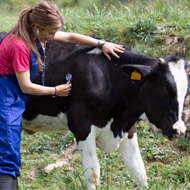Step closer for Aberystwyth vet school

The joint veterinary medicine programme will focus on farming and livestock.
Plans to set up a dedicated veterinary school in Aberystwyth have moved a step closer.
On Monday (13 June), Aberystwyth University and the RVC announced a joint veterinary medicine programme that will focus on farming and livestock.
Lesley Griffiths, cabinet secretary for environment and rural affairs, said the collaboration is ‘excellent news for Welsh farmers and to the veterinary profession.’ At present, Wales does not have a veterinary education provision.
“Veterinary education for Wales has long been a topic of discussion and this is an ambition now being realised,” said Ms. Griffiths. “The centre will provide a much needed hub of veterinary expertise right in the heart of our longest established university.”
Abeystwyth has a long record of excellence in research and teaching in the fields of agriculture. Together with the RVC, researchers now hope to secure and enhance animal health ‘in Wales and beyond’.
“Aberystwyth University is one of the leading Universities in the UK with internationally recognised expertise in animal and agricultural sciences,” said Professor David Church, RVC vice-principal for learning.
“We believe there are real opportunities at numerous levels for the RVC to work with Aberystwyth in developing a veterinary degree programme tailored to the needs of the Welsh farming and animal health industries. We are both proud and excited to be part of this collaborative venture.”
A working group of experts from the University’s Institute of Biological, Environmental and Rural Sciences and the RVC will now design the joint programme and specify new facilities at Aberystwyth University.
The team are due to deliver their report to the governing bodies of both institutions by August 2017.



 The latest
The latest